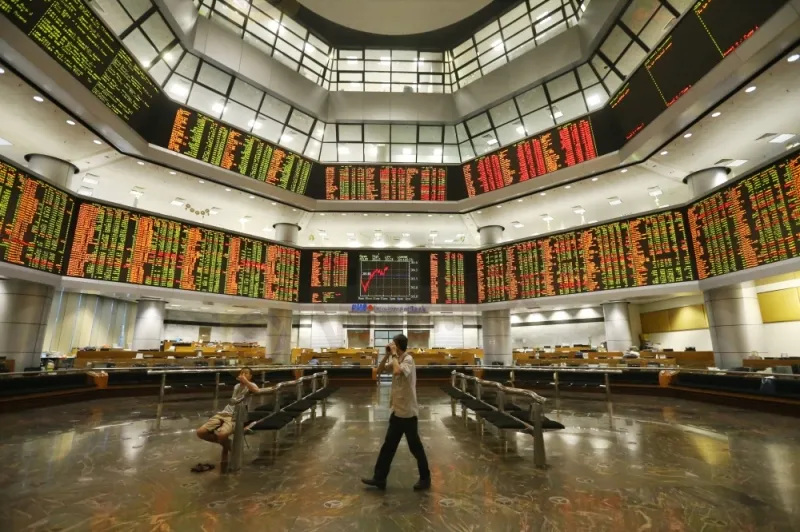Bursa Malaysia opens lower due to profit taking
Abstract:The broader market experienced a negative trend with decliners outnumbering advancers at 147 to 126. Additionally, 260 counters remained unchanged, 1,732 were untraded, and 17 others were suspended.

KUALA LUMPUR, August 2 — Bursa Malaysia started the day on a lower note as investors continued profit-taking, influenced by Wall Street's mixed performance in the previous session.
As of 9.10am, the FTSE Bursa Malaysia KLCI (FBM KLCI) declined by 2.99 points to 1,448.25 from Tuesday's closing level of 1,451.24.
The main index started the day with a decline of 1.79 points at 1,449.45.
In the broader market, decliners outnumbered advancers with a ratio of 147 to 126, while 260 counters remained unchanged, 1,732 were untraded, and 17 others were suspended.
The total turnover amounted to 203.32 million units valued at RM89.52 million.
Malacca Securities Sdn Bhd reported that Wall Street concluded with a mixed performance, as the Dow Jones Index recorded a modest 0.2 percent gain, while the S&P 500 and Nasdaq declined by 0.3 percent and 0.4 percent, respectively. This outcome was attributed to the varied results of corporate earnings.
In Malaysia, the S&P Global Malaysia Manufacturing PMI for July 2023 recorded a reading of 47.8, indicating a continued slowdown in business conditions with a recovery in demand still some distance away.
Despite the challenging conditions, analysts view the current pullback as a healthy correction, allowing the market to digest recent gains.
Furthermore, the lower liners in the market are undergoing a consolidation phase as traders adopt a cautious approach and adopt a wait-and-see stance ahead of the state election, according to the brokerage's note.
Regarding sector performance, defensive sectors like healthcare, utilities, and REITs may come into focus amid emerging signs of volatility. On the other hand, the technology sector may mirror the weakness seen in the Nasdaq overnight.
Among the heavyweight stocks, Maybank declined four sen to RM8.95, CIMB fell five sen to RM5.47, Tenaga Nasional slid two sen to RM9.53, and Petronas Chemicals decreased six sen to RM6.79. Meanwhile, Public Bank remained unchanged at RM4.12.
In terms of active stocks, Revenue, Advance Synergy, and Widad each saw an increase of half-a-sen to 26.5 sen, 16.5 sen, and 43 sen, respectively. Tanco and its warrants remained unchanged at 54.5 sen and 22.5 sen, respectively.
On the index board, there were declines observed in several indices: the FBM Emas Index dropped 18.74 points to 10,639.83, the FBMT 100 Index decreased 18.74 points to 10,333.71, the FBM Emas Shariah Index weakened 15.20 points to 10,907.59, the FBM ACE Index eased 13.65 points to 5,293.76, and the FBM 70 Index declined 14.43 points to 13,956.78.
In terms of sectors, the Plantation Index saw a decline of 6.20 points to 7,138.21, the Industrial Products and Services Index reduced by 0.43 of a point to 167.14, and the Financial Services Index slid by 47.52 points to 16,144.74. However, the Energy Index showed a slight increase of 4.64 points to 837.75.

Read more

Inflation is Here—How Will It Hit Stocks, Forex, Crypto, and Commodities?
Inflation is a force that ripples through every corner of the financial world, reshaping investment landscapes, shifting market sentiment, and altering the trajectory of economies. From Wall Street to the foreign exchange market, from digital assets to raw materials, inflation's impact is far-reaching. Traders who fail to understand its influence risk being caught off guard, while those who adapt can seize profitable opportunities.

200 Years of Market Mayhem: Every Major Financial Crisis Explained
Financial crises have shaped economies for centuries, often leaving a trail of devastation in their wake. While each crisis has its own unique causes, recurring themes, such as speculation, regulatory failures, and external shocks, continue to threaten global markets. This article explores the most significant financial collapses in history, revealing the patterns that link past crises to modern financial instability.

Super Micro Computer Eyes $40B Revenue by Fiscal 2026 Amid Challenges
Super Micro Computer targets $40B revenue by fiscal 2026 despite slashed 2025 guidance and Nasdaq delisting risks. Shares surge 10%.

Interactive Brokers Review 2025: Pros and Cons Revealed
Interactive Brokers is a well-established stock broker compared to many of its peers like Wellbull and offering a large selection of tradable securities, and it offers $0 per share on stock and ETFs (for U.S residents only) with its IBKR Lite plan. Besides, it also offers the most advanced platforms to foster superb trading experience. In this way, Interactive Brokers features the largest clientele compared to its competitors, like Robinhood, Fidelity and Charles Schwab, over 2.6 million institutional and individual brokerage customers.
WikiFX Broker
Latest News
Why Do You Keep Blowing Accounts or Making Losses?
eToro Adds ADX Stocks to Platform for Global Investors
B2BROKER Launches PrimeXM XCore Support for Brokers
Germany's Election: Immigration, Economy & Political Tensions Take Centre Stage
WikiFX Review: Is IVY Markets Reliable?
Checkout FCA Warning List of 21 FEB 2025
Google Bitcoin Integration: A Game-Changer or Risky Move?
It is Not True Love | Tips on Avoiding Romance Scams
XTB Secures Chilean License, Expands Latin America Footprint
Fortuno Markets Review: A Risky Choice for Traders?
Rate Calc
